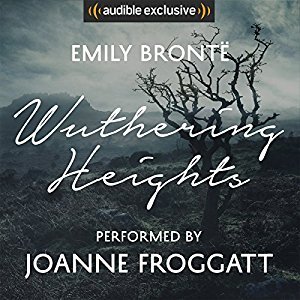- The Good: Doomed romance! Cold vengeance!
- The Bad: Unnecessary narrators and frame stories
- The Literary: A dark and gothic literary treat
Upon overhearing that the love of his life Catherine Earnshaw could not marry him because of his low status, Heathcliff abandons his home, a desolate house on the wild moors of Yorkshire. He returns years later, rich and successful, to Wuthering Heights but finds Catherine married. Tortured, Heathcliff begins a long journey of revenge upon those who once rejected him.
I love this book. Let me count the ways.
The desolate wilderness of the moors is a perfect moody landscape for this claustrophobic Gothic classic. This is not a tale about navigating the subtle rules of Victorian propriety, but of the consequences of class, those who live outside of it, and the obsession to prove its meaninglessness. Two families are inextricably linked, and the entire story takes place either at Wuthering Heights, the estate of the Earnshaws, at Thrushcross Grange, the estate of the Lintons, or the few miles in between.
Brontë crafts a romance that is at passionate, wild, hateful, and tragic. Catherine and Heathcliff are desperately in love, but neither portrays a graceful and tender partner. In fact, mix brooding Heathcliff with selfish Catherine and you’ve got an obsessive, possessive, narcissistic, and out-of-control relationship. Their love is doomed so that both Catherine and Heathcliff are sick with misery, and these actions ripple beyond themselves to envelop both households, even beyond their deaths.
Heathcliff’s tale is told simply, without judgement. He is adopted into family that shows him no love, he becomes obsessed with his childhood playmate, and when scorned, he proceeds to enact a slow vengeance upon not only the people who scored him, but their children as well. Heathcliff never finds anything worthy of his love; everyone is cast aside. He beats his wife. He imprisons his son. He manipulates the younger Cathy. He neglects the adopted son who loves him. The sins of the father are inherited, and Heathcliff ensures all the children suffer the transgressions of their parents.
I love Wuthering Heights because of its tragic romance, but also because it’s darker and more satisfying for its revenge plot. It’s emotionally engaging, and as Heathcliff makes one bad decision after another, descending into his own self-imposed private hell, the tragedy and horror unfolds. Near death, Heathcliff is described as like a ghoul or vampire, and indeed, he’s the vampiric figure from which all modern vampire-love interests derive. Heathcliff and Catherine are doomed, but maybe their love will carry over into the afterlife.
The gothic writing style and fluid narrators only add to the surreal and deceptive landscape. Sure, there’s no way Nelly (the servant) could have known what happened because she wasn’t there, but it’s not about accuracy. What’s important here is the legend. What seems extraneous to me is the frame story, which starts and stops and meanders and seems overly complicated.
Recommended for fans of dramatically dark romance and vengeance!
